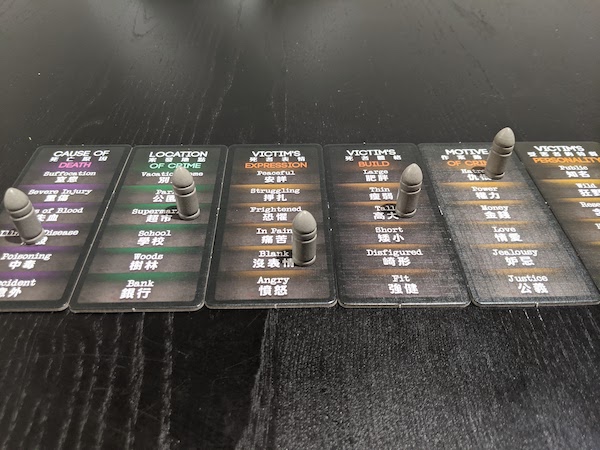Got nothing to do on a dark and stormy night? Why not gather your friends and solve a murder?
Whodunit?
Heavy rain.
A chalk outline.
The metallic smell of blood.
You and the other investigators surround the body looking for clues. There's something funny about this case. Funny like 12 cops investigating a nobody. The realisation hits you like a knife in the back.
Someone here did it.
Deception: Murder in Hong Kong is a 4-12 player party game which has you play as either a Murderer covering up your crime, an Investigator trying to uncover the Murderer, or the Forensic Scientist who knows who and how they did it, but can only talk through "facts" about the case.
The roles, along with a number of clue and means cards are handed out randomly during setup. The murderer then shows the Forensic Scientist a combination of 1 clue and 1 means card in secret.
Then the game begins in earnest, with the Forensic Scientist needing to communicate this combination to the table through scene tiles. These tiles are never as direct as you'd want them to be. For instance one scene tile might be 'Condition of the corpse' with the options being: Still Warm, Stiff, Decayed, etc. You will have to ask yourself: if someone was punched to death, how would their corpse hold up?
While you're deliberating this gruesome detail, the rest of the table discusses the clues so far. As once you're done dolling out all the evidence, there's a presentation round, where everyone gets to present their theory on who did it and how.
After 3 presentation rounds if no one has correctly guessed the correct combination. Then the statute of limitations has passed, and the murderer gets away.
 The Forensic Scientist has given the evidence.
The Forensic Scientist has given the evidence.
Tell me a story
I dislike a lot of social deduction games, as they usually they descend into a he said, she said argument and the most emotional player wins. Deception: Murder in Hong Kong gets away from this by changing the goal from implicating a person, to implication an inanimate combination of cards. It takes emotion out of the equation, and allows people to make wild accusations with no feelings being hurt.
Another change for the genre is it gives each player agency to win the game. Even though it's still a team game, there's no consensus needed in order for the team to win. You just need to point at a card combination and say the statement 'I think this is how it happened'.
Though it also stays true to genre with its lack of information, as everything given to the Investigators is cryptic or vague. For instance, the Forensic Scientist might have to give a clue about the victims physical build, or what time of day the murder happened. These are abstract concepts when relating them back to a skull, and meat cleaver.
What often happens though, is you'll pull together a narrative of how the crime happened. OK. So skull and meat cleaver, these guys were butchers, which means they're probably strong, and it probably happened just after work because they'd still be at the shop, but no one would be around.
It breeds creativity, and from that enjoyment. Not only for the story you've created, but watching to see if you've told it well enough for the Investigators to clue into it. It's the same feeling you get from games like Mysterium, or Dixit. Where you're trying to interpret an interpretation, and it's equally important to read the person as well as the clues they've given.

Taking the shot
One of my favourite mechanics of all time comes from Deception: Murder in Hong Kong, and it's a simple one. At the start of the game each investigator is given a badge token. When you take your guess at the killer card combination, if you get it wrong, you need to give up your badge. From then on, you can only discuss your ideas in the general setting, and can no longer present, or take another guess.
It gives a meaningful consequence for getting your guess wrong. And even though it means nothing, the tactile nature of giving away your badge feels like you're giving up something important. This plays on your mind, and often you'll hear people voice: I think it's this, but I don't want to risk my badge.
It also plays heavily into the rogue cop cliché, and is right for hamming it up with the group.
As I mentioned before, everyone gets a guess. This allows for the drama of heroics, and sacrifices, where there might be a number of options, and someone throws away their badge just to help narrow it down. Or it might come down to the last investigator who's trying to process everything shown so far, and everyone's on the edge of their seat as they make a final uncertain guess.
It's so simple, but I love it so much.
This last scenario is one of my favourite board gaming memories, where I was the Forensic Scientist, and the means of death was a dog bite. The scene tile I had to put down was relationship with the victim. The clue I gave was best friend. The whole table ignored the clue, thinking it meant nothing, until it came to the last investigator. He had also dismissed it up until that point as well, many thanks to the Murderer for sowing doubt. Anyway, he paused thought about it, and then made the connection. Best friend. Man's best friend. Dog. It was a completely different direction to all the guesses so far. But it was right, and we won the game.

The last bullet in the chamber
There's an inherent issue with these types of games, where it lives and dies based on the people in the key roles. If the Murderer chooses an easy combination, the game is anti-climatic. Likewise, if the Forensic Scientist doesn't provide good clues. Then the Murderer gets away without challenge. While you can't veto people from these roles, it's a risk you will need to take if it's the first time playing with new people.
The other people problem with Deception: Murder in Hong Kong is it's really light on rule structure and time constraints. In a bigger group, it can get out of hand quickly, with everyone talking separately about their own conspiracy theories. You need to be prepared to facilitate the game to ensure it continues flowing forward.
Otherwise, Deception: Murder in Hong Kong is one of my go-to party games and never fails to disappoint a crowd. It toes the line between being creative and logical, allowing for great conversations and drama. And while it tackles a serious subject matter, it never forgets its a game. With some of the means and clues being self-aware in their whimsy. I talked last week about how Mysterium is being beaten out by games with newer and better designs. Deception: Murder in Hong Kong is one of those games.
Thanks for reading. Visit Roll to Review, where I'm ranking all games I review.
 Games
Games How to resolve AdBlock issue?
How to resolve AdBlock issue? 


















